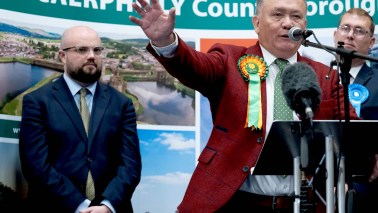I’ve been sitting on a sofa in my wife’s house in Tuscany reading an article about a new play that has just opened in New York. It’s by David Auburn, it’s called The Columnist and it’s about Joseph Alsop, a once powerful Washington journalist who died more than 20 years ago. The article, from the New York Times, says that Joe is now a completely forgotten man, but not by me. The pale terracotta-coloured cover of the sofa I’ve been sitting on is a reminder of him. For it was Joe who recommended the Washington seamstress that stitched it for me — an excellent woman who, he claimed, had been one of President Kennedy’s innumerable mistresses. The date was 1986, the Independent had just been launched, I had been appointed its first Washington correspondent, and I was furnishing the rented house in Georgetown that was to double as my home and the newspaper’s Washington office. The sofa, purchased at the Georgetown branch of Habitat, eventually came back with me to Europe from that elegant quarter of the American capital and ended up in Tuscany, where it looks perfectly at home in its rustic setting.
I had become a friend of Joe Alsop after meeting him in earlier times at a lunch at the British Embassy in Washington and saw a great deal of him during my stint as the Independent’s American editor. But by then, in the 1980s, Joe’s glory days were over. It had been some years since he had stopped writing the thrice-weekly column, syndicated in 300 newspapers, that had brought him great political influence, and he had settled by then for a gentlemanly retirement in a handsome, tastefully furnished Georgetown mansion, which contained his fine collection of antiquities and objets d’art and where he gave elegant dinner parties in a dining-room lined with framed copies of family portraits (the originals having been sold to an American university).
For Joe was a toff, a gentleman journalist, a pillar of the old Wasp establishment. His father had been a prominent Connecticut Republican, who repeatedly tried but failed to become governor of the state, and he was also a distant cousin of Eleanor Roosevelt, a fact of which he was inordinately proud. So when he became a journalist — then a rare calling for someone of his background — and eventually a political commentator in Washington, he had easy, informal access to everyone in authority. He would describe how in the post-war years, when America was at the summit of its power, he had been able to wander into the State Department whenever he felt like it and randomly knock on doors, including that of the Secretary of State, to have impromptu chats with government officials. The fate of the world was then in the hands of a little group of upper-class friends in a cosy provincial city, where they dined with each other every night and seldom talked to anyone else.
Joe’s pre-eminence among political columnists was assured by his friend President Kennedy’s decision to make his house in Georgetown his final port of call before returning to the White House after his inauguration as president in 1961. He dropped in after an evening of dancing at the inaugural balls and stayed there drinking terrapin soup and chatting with Joe until after 3 a.m. This gave an enormous boost to Joe’s social status and to his column’s prestige. The column was contentious and opinionated, but he called it ‘Matter of Fact’ to underline his commitment to the principle that a columnist’s job was not just to peddle opinions but also to bolster them with newly revealed facts. He believed very strongly that the commentator should be a reporter too.
His views were generally liberal at home — he despised the demagogic Senator McCarthy (another ‘Joe’) — but ferociously anti-communist abroad. And such was his enthusiasm for the Vietnam war that when President Johnson sent another 50,000 troops out to Vietnam, he is reported to have said: ‘There, that should keep Joe Alsop quiet for a while.’ But it was Joe’s unwavering enthusiasm for that doomed military enterprise that caused his eclipse.
In the meantime, he had survived a scandal which, if it had been made public, would have finished him more than a decade earlier. For Joe was a closet homosexual, and in 1957 was photographed by the KGB for the purposes of blackmail having a homosexual liaison in a Moscow hotel room. Joe briefly vanished, leaving a note for the American ambassador (a good friend of his, of course) expressing shame and remorse, but was quickly found and came clean about everything.
It was to Joe’s credit that fear of exposure failed in any way to tone down his attacks on the Soviet Union or otherwise temper his anti-communist rhetoric; and it was to the credit of Joe’s many enemies in the American liberal media that none of them breathed a word about his humiliation, even though the KGB had sent them all copies of the compromising photographs. So Joe carried on as before, the same old self-regarding curmudgeon, with his fierce opinions, his old-fashioned elegance, and his eccentric accent (once described as ‘Charles Laughton playing Oscar Wilde’), until his habit of 90 cigarettes a day finally killed him with lung cancer. But beneath all his posturing there was always a sweet, vulnerable and affectionate man.





Comments